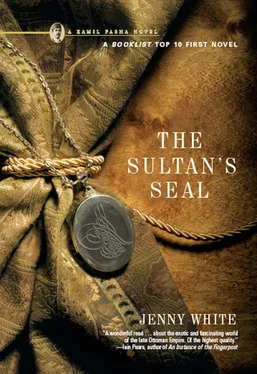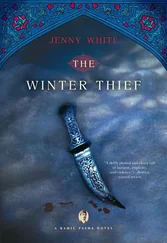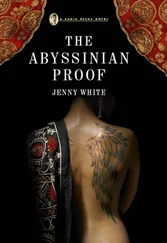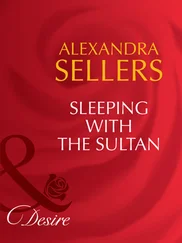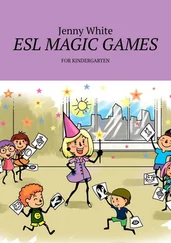Jenny White - The Sultan's seal
Здесь есть возможность читать онлайн «Jenny White - The Sultan's seal» весь текст электронной книги совершенно бесплатно (целиком полную версию без сокращений). В некоторых случаях можно слушать аудио, скачать через торрент в формате fb2 и присутствует краткое содержание. Жанр: Исторический детектив, на английском языке. Описание произведения, (предисловие) а так же отзывы посетителей доступны на портале библиотеки ЛибКат.
- Название:The Sultan's seal
- Автор:
- Жанр:
- Год:неизвестен
- ISBN:нет данных
- Рейтинг книги:5 / 5. Голосов: 1
-
Избранное:Добавить в избранное
- Отзывы:
-
Ваша оценка:
- 100
- 1
- 2
- 3
- 4
- 5
The Sultan's seal: краткое содержание, описание и аннотация
Предлагаем к чтению аннотацию, описание, краткое содержание или предисловие (зависит от того, что написал сам автор книги «The Sultan's seal»). Если вы не нашли необходимую информацию о книге — напишите в комментариях, мы постараемся отыскать её.
The Sultan's seal — читать онлайн бесплатно полную книгу (весь текст) целиком
Ниже представлен текст книги, разбитый по страницам. Система сохранения места последней прочитанной страницы, позволяет с удобством читать онлайн бесплатно книгу «The Sultan's seal», без необходимости каждый раз заново искать на чём Вы остановились. Поставьте закладку, и сможете в любой момент перейти на страницу, на которой закончили чтение.
Интервал:
Закладка:
“Like the moon and the tides, the human heart has many phases. Wait for them. They will not be rushed.”
I was not sure what Ismail Dayi meant, but in his gentle shadow, I was able to cry.
The fortune-teller behind the Spice Bazaar was almost blind. He had a long white beard and wore a tattered brown robe and a striped cap. Violet gave him a kurush and he opened the wooden cage. A fat white rabbit with black markings emerged timidly onto the fortune board. After a moment, he nudged the board with his quivering pink nose and the old man worried free the tiny piece of paper pegged to the board at the place the rabbit had indicated. Violet reached out to take it. I nudged her and she gave the man another kurush. The rabbit emerged again and nuzzled another piece of paper. Violet and I took our fortunes to the adjoining park and sat beneath a tree to read them. On my paper was written: “Always an abundant day. A life of movement and novelty.” On Violet’s paper: “Loyalty at the right place and the right time will rescue you from a difficult situation.” The fortunes were written in an elegant script and we conjectured about the identity of such a fine hand. The fortune-teller’s son, perhaps. Surely the old man did not earn enough money to hire a scribe to write out his fortunes.
My fortune, I mused, appeared to be marriage and I didn’t see what that had to do with abundance. Movement and novelty, certainly. Abundance of wealth, too, perhaps. But not the abundance of cheerful, fat-cheeked women in their songbird-filled rooms. I would always be the sparrow pecking at the bars.
Papa had decided that I was to marry his colleague at the Sublime Porte, Amin Efendi. A man fifteen years my senior, with a bristling mustache that extended beyond his cheeks on either side. The first time I saw him was when he came with a group of men to visit Papa. I had thought it odd that Papa asked me, and not the servant, to bring the men coffee. I couldn’t help but notice the man I later learned was Amin Efendi. His knees made sharp points in his trouser legs. He rested his right elbow on the arm of the chair and trailed his long, white fingers in a slow, indolent circle across his shirtfront. His eyes followed me around the room as I served small cups of coffee from a silver tray. When I leaned over to bring the tray closer, I smelled boiled wool and a faint odor of roses, which I find repellent on a man. I could feel his eyes follow the movement of my breasts under the cloth. He took the cup and, for a brief moment, we were touching through the tray. I jerked away, spilling coffee from the other cups.
Papa insisted that I dress in Western gowns when he entertained guests. He allowed a trailing scarf over my hair when strangers were present, but insisted that my face be uncovered. I did not mind wearing such dress, but I resisted the corset. What kind of civilization, I wondered, tortured the body by compressing it so that it was a challenge to breathe and move and even made it difficult to sit on the already uncomfortable Frankish chairs? As a servant, Violet had been spared my father’s civilizing efforts. She laced my corset, but did not put much effort into drawing it tight. Aunt Hüsnü, whose maid laced hers so tightly that her body took on the shape of a wasp, looked askance at me when I emerged from my room. But she said nothing. My loose curves and easy movement set off to good advantage her own disciplined torso. My gowns slipped messily over my hips and along my shoulders, while hers looked perfectly proportioned, like the drawings of fashionable Frenchwomen in magazines.
A few weeks after I had served coffee to Papa’s guests, he called me into his study. I stood on the blue Persian carpet in front of his desk. He sat behind his desk, hands folded on his lap, his lips curved upward at each corner. He had a wide, kind face, a face that promised that he would listen patiently and understand what you had to say. The only hint that you might be wrong in your presumption was that his eyes remained cool and appraising. The smooth outlines of his jaw and features made his face unreadable. I was wrong often enough then, but only now have come to realize that his face encouraged you to project the response you needed and desired onto it.
Papa told me that his colleague, Amin Efendi, wanted to marry me.
“Don’t you think it’s time for you to start a family of your own? You’re twenty years old. He’s a good, steady man, reliable. He can provide you with a fine household. His wife died two years ago. He wants to remarry, and he wants to marry you.”
When I didn’t say anything, Papa added, “You needn’t be concerned. There are no children from the first marriage.”
I looked at him and tried to smile. “But I’m not planning to marry, Papa. At least not at the moment. And I don’t wish to marry Amin Efendi. He’s much too old for me.”
He opened his mouth as if to speak, but said nothing. During the long silence that followed, he sat back in his chair and regarded me with an unreadable expression. In order not to think, I counted the objects on his desk-two inkwells, a letter opener, a stack of white linen paper, four pens. One of the pens was leaking ink onto the blotter.
“Your pen is leaking, Papa,” I blurted out nervously, pointing to the stain.
Papa stood abruptly and stalked out of the room. Later, at dinner, he didn’t look at me but said matter-of-factly into his stewed lamb, “You will be engaged to Amin Efendi in three months. That will give you enough time to prepare. Allah knows where we’ll be able to procure a trousseau for you. Your mother taught you nothing. We’ll have to buy it.” He looked at Aunt Hüsnü, who nodded.
“I will not marry him, Papa. It is forbidden by the Holy Quran to force your child into marriage.” I set myself against my father. My mother’s approving presence seemed to regard the scene from afar.
“What rot is that? Is this what that ignorant Ismail Hodja taught you?” Papa shouted. “Filled you with religion like a stuffed dolma. This is a modern household and I expect you to obey me, not a musty old book muttered over by a lot of dirty old men with one foot in the darkness of history and one foot in the grave.”
Aunt Hüsnü continued chewing throughout this exchange, as if nothing at all could suppress her enjoyment of stewed lamb with apricots.
Violet came through the serving door behind Papa and Aunt Hüsnü carrying a tureen. I saw her spit into the soup.
20
The high, clear notes of the boy’s voice rise above the clamor of Kamil’s outer office.
“I can’t tell you. I’m only supposed to tell the bey.”
Suddenly the boy begins to cry. There is the sound of a scuffle.
Irritated, Kamil calls his assistant and asks him what is going on.
“A boy claims to have a message for you and refuses to divulge it to the head secretary.”
“All right,” Kamil sighs, “send him in here.”
The boy is about eight years old, slim and wary as a street cat, his hair cut close to his head. He is dressed in lovingly patched trousers and a colorful knit sweater. Upon seeing Kamil, he falls to his knees and prostrates himself on the floor, his nose pressed against the blue arabesques on the carpet. Kamil sees that he is shaking. He walks over and puts his hand on the boy’s bowed back.
“Stand up,” he says gently. “Stand up, my boy.”
The boy cautiously lifts himself from the floor, but stands with his head lowered. Kamil sees, however, that the boy’s eyes dart around the room, noting everything.
“What is your name?” he asks, trying to put him at ease.
“Avi, bey.”
“Well, then, Avi, why did you need to see me?”
Avi looks up at Kamil. His brown eyes are enormous in his fine-boned face. Kamil thinks to himself that these are eyes that see everything, ravenous eyes. He feels a pang of longing for the omnivorous freedom of a child’s appetite for life, not yet disciplined to distinguish raw from cooked, feasting without caring whether life is served at a table or from a tray on the floor. He smiles at Avi.
Читать дальшеИнтервал:
Закладка:
Похожие книги на «The Sultan's seal»
Представляем Вашему вниманию похожие книги на «The Sultan's seal» списком для выбора. Мы отобрали схожую по названию и смыслу литературу в надежде предоставить читателям больше вариантов отыскать новые, интересные, ещё непрочитанные произведения.
Обсуждение, отзывы о книге «The Sultan's seal» и просто собственные мнения читателей. Оставьте ваши комментарии, напишите, что Вы думаете о произведении, его смысле или главных героях. Укажите что конкретно понравилось, а что нет, и почему Вы так считаете.
